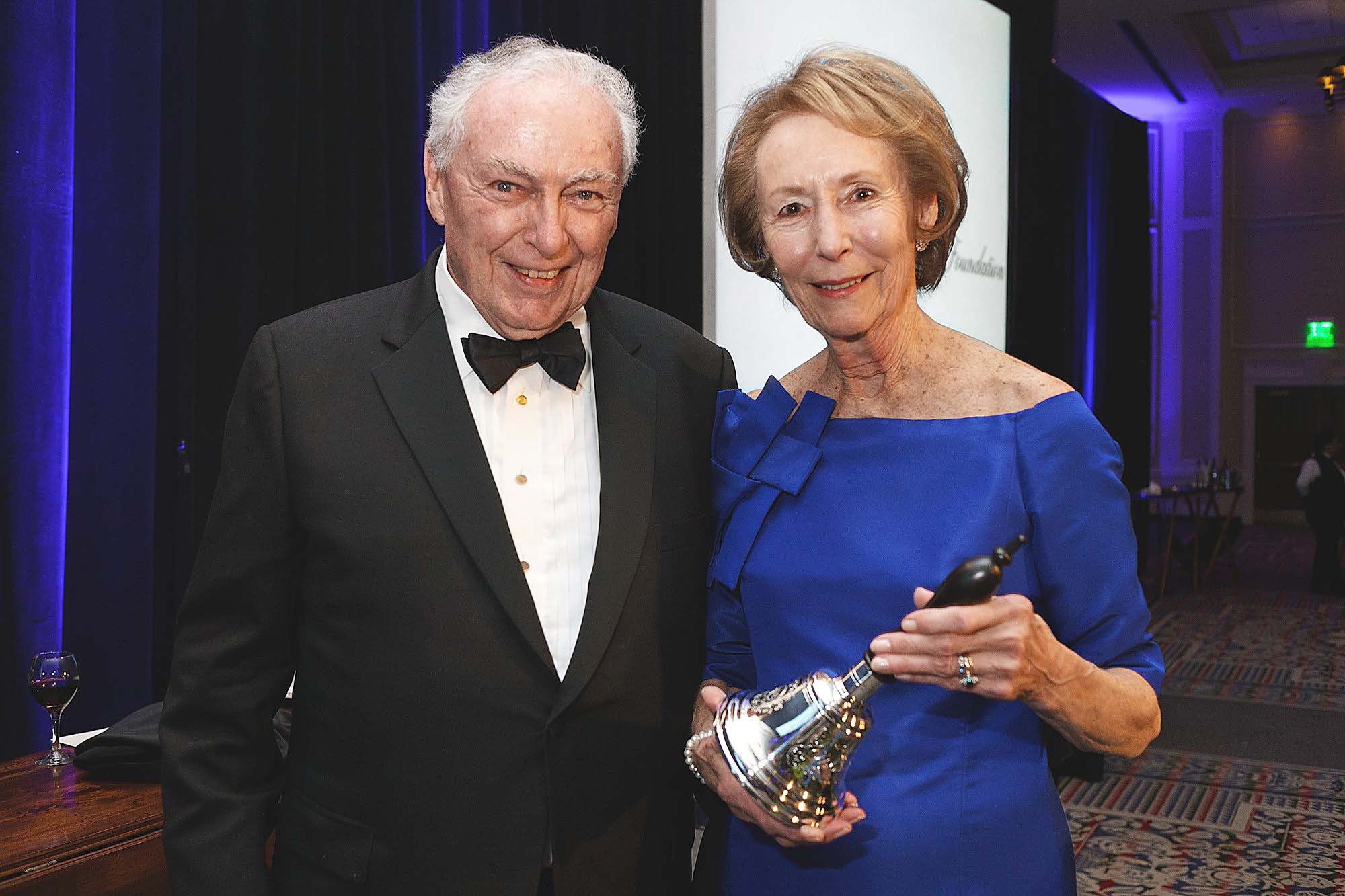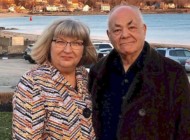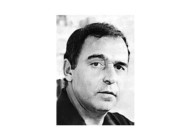
Colin and Nancy Campbell received the Churchill Bell at a reception and dinner in their honor, held at the Williamsburg Lodge on November 22, 2014. Photo courtesy Colonial Williamsburg.
WILLIAMSBURG, VA. —The Colonial Williamsburg Foundation mourns the passing of Colin G. Campbell, president and chief executive officer (CEO) of the foundation from 2000 to 2014. Campbell was a dauntless advocate for the rights and responsibilities of citizenship. His tenure at the foundation was marked by strong leadership amid economic instability, new construction projects in the Historic Area, expanded educational programming and new institutional relationships.
“Colin’s steady hand made an indelible imprint on Colonial Williamsburg, ensuring its survival as a national treasure and charting a course focused on preservation, education and civic engagement that the institution is following today,” said Cliff Fleet, president and CEO of The Colonial Williamsburg Foundation. “He will be remembered by all who had the pleasure of knowing him as a wise and compassionate leader and a dear, dear friend.”
Campbell joined the foundation’s Board of Trustees in 1989 and for a period, served simultaneously as the organization’s leader as well as its board chairman. It was not long after he took over the helm as president in 2000 that the nation was rocked by the September 11, 2001, terrorist attacks that ushered in a period of prolonged economic instability, worsened by the recession of 2008. Despite the challenging economic landscape, Campbell worked to strengthen relationships with donors and partners alike. From 2000 through the end of 2013, the foundation raised a total of $687 million from 1.7 million individual donors. Total planned gift expectations tripled from $93 million to $298 million. The first Campaign for Colonial Williamsburg, begun in 1995 and launched in its public phase in 2001, surpassed its goal of $500 million at its completion four months ahead of schedule in August of 2006.
Under Campbell’s leadership, the Historic Area benefited from a spate of construction projects, including the reconstruction of Charlton’s Coffeehouse, the construction of Anderson’s Blacksmith Shop and Public Armoury, and the construction of the Market House. In his retirement, Campbell worked to fund the 65,000-square-foot expansion of the Art Museums of Colonial Williamsburg, which broke ground in 2017 and was unveiled in 2020. The Colin G. and Nancy N. Campbell Archaeology Center, currently under construction and slated to open in 2026, was named by lead funder Forrest E. Mars Jr in honor of Campbell and his wife, Nancy, who was widely credited as an active partner in leading the institution.
“Colin’s legacy endures not only in the spirit of the foundation, but in its physical landscape as well,” said Carly Fiorina, chair of Colonial Williamsburg’s Board of Trustees. “From the coffeehouse to the art museums, the Armoury to the new archaeology center — all of these buildings are testament to Colin’s commitment to this institution, and generations upon generations of visitors will reap the benefits of projects that owe their origin stories to him.”
Campbell’s tenure also saw the expansion of programming focused on the period leading up to and during the American Revolution. The programs highlighted the diverse population and perspectives of Williamsburg residents, including enslaved and free Black people, women, and people of different classes.
Key to Campbell’s leadership success were the partnerships he developed with organizations throughout the region and nation to advance shared goals. Partner organizations included Washington DC–based Center for Strategic and International Studies, William & Mary’s Reves Center for International Studies, Jamestown Rediscovery Foundation and the Chautauqua Institution. Campbell served on William & Mary’s Board of Visitors and on the boards of Hampton Roads PBS affiliate WHRO and the Fort Monroe Authority.
Before coming to Williamsburg, Campbell was president of the Rockefeller Brothers Fund from 1988 to 2000 and president of Wesleyan University from 1970 to 1988. He went to Wesleyan in 1967 after having been vice president of the American Stock Exchange.
Campbell was a graduate of Cornell University and of the Columbia University School of Law, class of 1960. He received awards from the New-York Historical Society, WHRO (Public Broadcasting), the Chautauqua Institution, Preservation Virginia, William & Mary and was the 12th recipient of Colonial Williamsburg’s Churchill Bell, given to both Campbells in 2014.
“Colin was a man who valued individuals for who they were, not for what they could do for him,” said Ronald L. Hurst, the foundation’s chief mission officer and senior vice president of education and historic resources. “As a result, he encouraged everyone who worked alongside him to be the very best versions of themselves which, more often than not, provided the greatest benefit to everyone involved. He will be greatly missed by this institution and by all who were privileged enough to work alongside him.”




